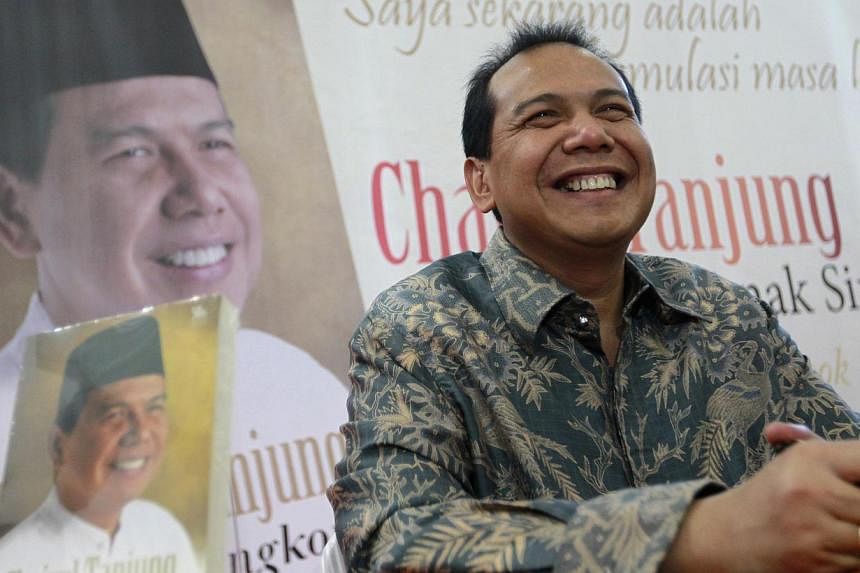JAKARTA/SYDNEY (REUTERS) - Indonesia's copper industry is pinning its hopes on one of the country's richest businessmen to help restart concentrate exports worth hundreds of millions of dollars, halted nearly five months ago over a controversial tax. With no obvious immediate political ambitions, billionaire Chairul Tanjung who was appointed in May as chief economics minister, is seen as more likely than his predecessor to reach a politically unpopular compromise with foreign miners, although he will still need the support of the president.
Adding to pressure for a deal, Newmont Mining Corp, one of two big foreign copper miners in Indonesia, said on Tuesday it has halted production of copper concentrate at its Batu Hijau mine after its stockpiling facility reached capacity. Newmont said it would await the outcome of government talks this week before deciding whether to stand down workers. Mr Chairul is also due this week to meet Freeport-McMoran Copper & Gold Inc chief executive Richard Adkerson.
Indonesia on Jan 12 introduced a ban on ore exports and levied an escalating tax on concentrate exports as part of efforts to force miners to build smelters and processing plants in Southeast Asia's largest economy. The new tax halted about US$500 million worth of monthly mineral ore and concentrate exports and led Freeport and Newmont, who account for 97 per cent of the country's copper output, to slash output as both say the rules conflict with their contracts.
Indonesian President Susilo Bambang Yudhoyono last month chose Mr Chairul to replace former chief economics minister Hatta Rajasa, who is running for vice president in July's presidential election. Mr Tanjung said he would review the mining export rules after they hampered first-quarter economic growth, which grew at its slowest in more than four years.
On Monday, sliding exports pushed April's trade deficit to its second-largest in five years. "I have high expectations and hope," said Mr Tony Wenas, former CEO of Vale Indonesia and a board member of the Indonesian Mining Association. "He is a practical and pragmatic businessman when dealing with things - he is not a bureaucrat."
A trained dentist, Mr Chairul, 51, was ranked as Indonesia's fifth richest man by Forbes with a net wealth of $4 billion. His company CT Corp now operates two of the country's top five TV stations and has retail and banking interests.
Mr Chairul, who could not be reached for comment, has little time to make big policy changes as the current government's role in policy-making effectively ends in July, with a new government due to take over in October. "Tanjung is a very can-do, business oriented guy," said an Indonesian-based mining company executive, who declined to be identified due to the sensitivity of the issue. "He's already been in to see Freeport and he's concerned about the possibility of job losses in terms of people being laid off by them and Newmont, plus no tax receipts for as long as the export ban remains in place.
"He'll bang some heads together and the concentrate will start flowing again before the new government forms, which previously I thought was only a 50/50 proposition at best."
Neither Newmont nor Freeport could not be reached for comment. The mining association's Wenas said he expected any breakthrough would centre on an escalating export tax introduced by the government, as well as long-running mining contract renegotiations with both Freeport and Newmont. The two miners argue they should be exempt from the export tax, which kicks in at 25 per cent and rises to 60 per cent in the second half of 2016, before a total concentrate export ban in 2017, saying their current contracts prohibit any extra taxes.
Although both Newmont and Freeport have questioned the economic viability of building new copper smelters in Indonesia, the latter has agreed to study the possibility of building a copper smelter with state-owned miner Aneka Tambang.
Mr Chairul told reporters last month he would report the results of talks with major miners to the president, and adopt a long-term approach in negotiations. Details on what changes may be made to the export tax are not known, but last week Mr Chairul said the government would draft a new finance ministry regulation with separate requirements for miners making progress in the construction of smelters.
This would need to be approved by cabinet and President Yudhoyono, he said, adding that the government hoped exports would resume after this week's talks. Copper prices have risen in recent months, trading around US$6,893 a tonne on Tuesday, as an expected production surplus has has yet to materialise and LME and Shanghai stocks have dwindled.

